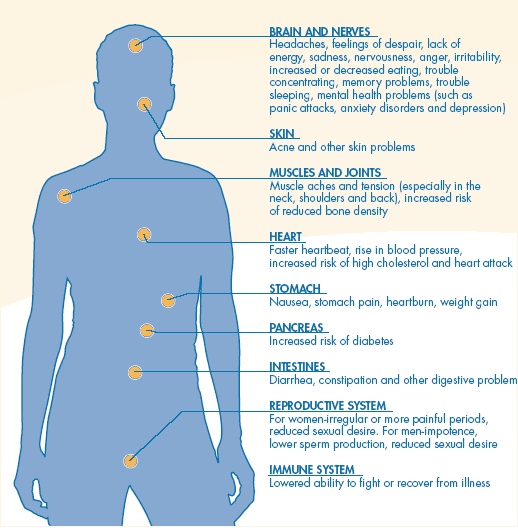Stress on the Body...The Good, The Bad, and The Ugly!
Manage Stress on the Body Like a Pro:
|
|
|
Stress on the body has vast effects. When do most of us pay attention to our bodies? Usually when something starts to hurt or not work properly. If you think of your whole body as a house, most of us stressed out people tend to spend the majority of our time in the attic. Don't get me wrong, Attics can hold many wonderful things: decorations, old pictures…But, attics can also collect cobwebs, dust, and scary, creepy crawlies. I would classify anxiety as a scary, creepy crawly. Stress likes to move out of the attic into the rest of the house. It often shows up as a headache, tummy ache, back ache, rash, erectile dysfunction, etc. Unfortunately, most people like to treat symptoms with creams and pills without treating the underlying cause of the problem. The mind and body are inseparable. Taking care of both the mind and the body is crucial to overall health, staving off the effects of stress on the body. You wouldn’t do this with other ailments, so don’t do it with your mental health. For example, if you are experience ear or hearing problems, you’d get it sorted and go to an audiologist - you wouldn’t just ignore it and hope it would get better on its own.
|
We are wired to protect ourselves from danger, and short-term stress is how we do that. But when there are several stressors particularly intense ones or it is over a long period of time, it adds up to be a factor that can damage our health.
Not all of the effects of stress on the body are bad. In fact, a normal physical stress response ensures motivation and survival. When we perceive a threat, real or imagined, our body goes into the automatic process known as "fight or flight" (a.k.a. the stress response.)
When you need to deliver a big presentation at work, the stress response helps you pay attention to your audience, rather than make your grocery list in your head. In the short-term, the effects of stress on the body can even save your life. For instance, you would gain extra strength to either defend yourself or escape from an attacker.
When a danger is perceived, your nervous system releases stress hormones, such as cortisol and adrenaline. These hormones sound the emergency alarm system in your head that says, "Wake up!" Your reaction time becomes shorter, your speed faster, your breath quicker, your blood pressure higher, your heart rate faster, and your senses sharper. These effects of stress on the body prepare you to either fight or flee the danger you perceive. It's amazing how the stress response safeguards us. The increased blood pressure and heart rate allow more oxygen and blood sugar to be delivered to important muscles. The increased sweating cools the muscles to ensure peak performance. Adrenaline and cortisol make sure blood is concentrated at the core of our bodies so that blood loss is reduced if our extremities are damaged.
The stress response occurs anytime we are in danger, but also occurs when we are surprised or frustrated. The effects of stress on the body are proportionate to the intensity of the perceived threat. So, when the threat is small, the stress response is small. When the "fight or flight" response becomes chronic, however, you are at risk of burnout and health problems.
The Physical Effects of Stress on the Body are Rampant
Stress on the Body: Hormonal Imbalances
Stress can even impact our hormones, which can in turn have a massive impact on your body and mind. Our hormones regulate how we feel and how our body functions, so a seemingly minor imbalance can cause major issues. Huddle Men’s Health can provide some answers to hormonal imbalances in men, but once the physical causes for these issues are ruled out, it’s a good idea to consider how stress may be affecting your body and hormones.
Stress is such a common word today. If you think about it, you have probably used it at least once this week, or was it more than once today? The effects of stress on the body show up at some point for everyone.
Why do we talk about it so much? The reason is simple: people are pulled in too many directions and have too many demands on their time, their finances, their physical strength, their mental ability and emotions.
Another reason for the amount of internal pressure in today’s world is the lack of solitude and quiet. Many people live alone but have constant input from some form of media or technology. Finding time and space for quiet and reflection is often a challenge or completely missing from one’s life.
All of this adds up to physical effects of stress on our bodies. Some of it is unavoidable. You move to a new city. You change jobs. Your child is sick. These are things largely outside of your control. But some of it we can control if we recognize the need.
Today we will look at the physical effects of stress on the body. This information may motivate you to take action and make some changes to take the pressure off yourself and protect your health!
Stress on the Body: Skin reactions
Stress can lead to breakouts and even itchy rashes and hives in some people.
Stress on the Body: Emotional conditions
From being in a blue or irritable mood to more serious mental issues like depression, your emotional health suffers when there’s stress in your life.
Women are better than men at hiding some emotions like anger and aggressiveness because the parts of their brains responsible for these emotions are larger than men's, but depression strikes women twice as often as men.
Stress on the Body: Sleep problems
Trouble falling or staying asleep is common in women affected by stress, and this is particularly counterproductive since a good night’s sleep can help ease stress.
Stress on the Body: Concentration difficulty
Stress makes it hard to focus and be effective in your responsibilities at home or work, and that can compound your problems if your stress comes from your job to begin with. Stress can cause concentration difficulties due to other complications such as tinnitus. Stress can aggravate this which could lead to distractions and not focusing at work or home. There are a few things you could try, research tinnitus relief to find some ideas and inspiration.
Stress on the body: Respiratory and cardiovascular systems
Stress hormones affect your respiratory and cardiovascular systems. During the stress response, you breathe faster in an effort to distribute oxygen and blood quickly to your body core.
If you have preexisting respiratory problems like asthma or emphysema, stress can make it harder to breathe.
Your heart also pumps faster. Stress hormones cause your blood vessels to constrict and raise your blood pressure. All that helps get oxygen to your brain and heart so you’ll have more strength and energy to take action.
Frequent or chronic stress makes your heart work too hard for too long, raising your risk of hypertension and problems with your blood vessels and heart. You’re at higher risk of having a stroke or heart attack.
Stress on the Body: Digestive System
Under stress, your liver produces extra blood sugar (glucose) to give you a boost of energy. Unused blood sugar is reabsorbed by the body.
If you’re under chronic stress, your body may not be able to keep up with this extra glucose surge, and you may be at an increased risk of developing type 2 diabetes.
The rush of hormones, rapid breathing, and increased heart rate can upset your digestive system. You’re more likely to have heartburn or acid reflux.
Stress doesn’t cause ulcers — a bacterium called H. pylori does — but stress may cause existing ulcers to act up. You might experience nausea, vomiting, or a stomachache. Stress on the body can affect the way food moves through your body, leading to diarrhea or constipation.
Stress on the Body, but there's no such thing as stress???
This sounds strange, doesn't it? But, if I handed you a basket and asked you to go out into the world and fill it with stress, what would you put in it? If you think about it, stress really isn't a "thing." Stress is made up of thoughts, feelings, and physical sensations stemming from our perceptions.
Sometimes, it's a good thing to perceive stress. You want to feel a bit stressed when someone cuts you off in traffic or when your alarm clock goes off. Stress can keep us safe and can motivate us. Stress is essential for survival. We get into trouble, however, when our perceptions of stress take over and do not serve any good purpose.
So, being able to change our perceptions and thinking patterns is a phenomenal tool. Anyone who's willing can change their interpretations of events, people and life. Not that this is easy, but it is possible.
Think about where the perception of stress comes from. Think about some of the people, places and things that stress you out. The common theme is always that you're perceiving things as being out of your control. If we felt in control all the time, we'd never feel stress.
So, the major key to stress management is taking back control. The first step is to believe you can manage stress - you're not just some empty shell bobbing along in an ocean of stress. It can be really difficult to believe we have control over our thoughts. Life seems to have a knack for dishing out challenges.
You never know when health issues, car accidents, job loss, and all kinds of other depressing situations may happen. It can feel, at times, that we've lost all control over what happens to us.
When the poop is hitting the fan, it's certainly hard to believe that stress is all "perception." That's why it's so important to get to know stress. When you really know and understand stress, you start to take back control. This may be really hard to believe, but sometimes stress is actually acting as our friend trying to tell us something is wrong and needs help.
Actually, it's not stress telling you something's wrong - it's YOU.
Since stress arises from your perception, you're the one who knows something needs to heal. So often, we want a quick fix to feel better right now, but the stress keeps coming back. It can be helpful to learn what stress (or more correctly you) is trying to tell you.
Chronic headaches at work may be trying to tell you to make adjustments at work or change jobs altogether. No amount of pills will make the headaches quiet forever.
Let Hypnosis Be Your Reset Button!!!
|
|
|
Stress on the Body Affects so Much...
|
If you turn on your TV right now, I can guarantee you'll see commercials for medications within 5 minutes. You're bound to see the moderate to severe plaque psoriasis lady, the overactive bladder people, the can't-get-it up erectile dysfunction couples, and the depressed people who no longer have an interest in walking their dogs - just to name a few. This is interesting to me. If you think back 15 to 20 years ago, did we ever see ads on TV telling us we should talk to our doctor about prescribing us particular medications? |
Never. So, why now? I have to believe it's because we're at a point in history where stress is at an all-time high.
The Centers for Disease Control estimate that 95% of all illnesses are either caused by stress or made worse by stress. Take a moment to think about some of your own ailments.
I know I get headaches when I'm stressed and that they keep getting worse the more stressed out I become. Aspirin can help, but the real resolution of my headache always comes when I finally relax.
Don't misunderstand what I'm saying. I'm not anti-medication. But, it would be helpful to know when plaque psoriasis flares up. Is it every time she walks into work?
Why do the good looking men, who are only in their early 50s, have erectile dysfunction? Are they worried about all the business calls they need to make? What kind of thoughts are depressed people having? Are they worried they'll never find another job?
It's a shame that people are mislead into believing there's a magic pill, some great panacea, that will make the hurt and all the symptoms go away.
This simply isn't true.
Just ask any person who's been taking anti-depressants for years but still feels depressed. There's got to be more to the solution than medications. Medications can only do so much. The rest of the solution depends on our willingness to change our thoughts and behavior so they help us rather than hurt us.
Most stressed out people just want to make the stress go away, often with medication. Stop trying so hard to make stress stop. As the saying goes, "To resist is to persist." The more we focus on making stress magically go away, the more stressed out we become. I've found it more helpful to listen to stress and try to figure out where it's coming from. It's not always easy, but it's better to change or fix what can be fixed than to try to mask stress with medications.
A great quote by Swami Sivananda says, "Crave for a thing; you will get it. Renounce the craving; the object will follow you by itself."
Stress on the Body:
Nature vs Nurture and Conscious vs Subconscious
If stress comes from our perceptions, why does it feel so out of our control? Physical symptoms especially can feel as though stress on the body is way out of our control. Unfortunately, most of us tend to believe that how we are is dictated either by genes or by upbringing or a combination of both and that we have no choice in how things turn out.
I often hear comments such as, "That's just how I'm wired." "I'm like this because it's how I was raised." I often hear excuses for poor behavior such as, "That's just how he is." Or, "He's always been that way."
Yes, nature and nurture play important roles in our lives and how we are shaped, but are they everything? I also hear and read a lot these days about the conscious versus the unconscious mind. The majority of what I read hinges on the assumption that most of our actions are guided by subconscious thoughts - ideas we're not even aware of. An article I read recently said something like 90% of our thoughts are subconscious.
Unfortunately, a lot of people may read that and think, "Why bother trying? If I have no awareness of my thoughts anyway, I must not have any control over them." That kind of thinking lends itself to creating excuses for staying stuck in patterns that aren't working.
Rather than think of the mind as containing conscious and unconscious thoughts, I prefer to think of thoughts as either aware or habitual. The brain has similarities to a smart phone. Memory loops or "apps" are little pathways the brain creates for thoughts, emotions and actions we have on a regular basis.
This can be a good thing!
For example, the first time you got into a car to learn how to drive was not easy. But, after a few trials, your brain clued in and thought, "Oh, you're going to do this driving thing. Okay, I'll create a shortcut so that you don't have to relearn how to drive every time you get in a car."
Think of the billions of things we do every day because of the "apps" in our brains. We walk, talk, clothe ourselves, go to work…the list goes on and on. I can't even imagine having to relearn all the things I do on a daily basis. I'm glad the brain is set up for automation.
But, you can understand how this "habitual mind" can work against us, at times. I know we can all think of someone in our lives who is negative.
You know that person you talk to, and the conversation goes something like this:
- Me: "Aren't you glad we have our jobs?"
- Negative Person: "No, this job sucks!"
- Me: "Do you want to get something to eat?"
- Negative Person: "There's nothing good around here."
The conversation goes on and on. Before you've even finished your sentence, the answer from the negative person is "No!" "I don't like it." "I don't want it." "It'll never work." This may sound simplistic, but that negative person's brain has also clued into patterns and thought, "Oh, you want to be negative all the time. Okay, I'll create an "app" so you won't even have to think about it. You'll just react negatively all the time." The "app" also updates itself!
This is how a stressful reaction to life events can become habitual. The anxious person has essentially trained his or her brain to automatically react in a stressed out way. For example, I lost my footing and fell over the edge of a sidewalk and sprained my ankle. After that incident, I was wary of sidewalks and would only walk along the side of the road. One day, I was in a nature preserve with a walking trail. I didn't want to walk along the trail for fear that something bad might happen there, too. As I walked along the edge of the path, I saw a bicyclist hit a rock and fall off her bike. See, these foot paths really are dangerous.
So, not only does the brain create these little memory loops or "apps," but it looks for other instances to reinforce the loop and keep it going.
Just think of all the "bad" habits we engage in on autopilot. These habitual thoughts can become deeply ingrained in the brain.
That's why it's never as simple as "Don't worry. Be happy." That's like telling a smoker, "You want to quit smoking? That's easy. Just don't buy cigarettes anymore, and don't bring them to your lips and light them." Physically, it may be possible for the person to quit smoking this way, provided they're tied to a chair somewhere. Realistically, it's not going to work out. The same applies to stress reduction and alleviating stress on the body. Telling yourself to just stop worrying will never be enough.
The good news is that we can install new "apps" in our brains. We can reprogram our brains to be more responsive to stress and less reactive to it. The reticular activating system or RAS is the portal through which nearly all information enters the brain. The RAS filters incoming information and affects what you pay attention to.
Your RAS responds to your name, anything that threatens your survival, and any information that you need immediately. The RAS also responds to novelty and is a great radar detector alerting you to anything new or different.
Why not use this radar detector to our advantage? We can introduce new activities and thoughts to the RAS, such as relaxation techniques and mindfulness exercises. After a while, these useful habits will form their own "apps."
To manage stress and stress on the body requires bringing our typical reactions to stressful events into our awareness and consciously changing our response to something more productive. After a while, the productive or helpful response will be our habit. It's tempting to want to fight fire with fire.
So many people get angry at their stress response or feel as if they'll never feel any better. Unfortunately, it's these types of thoughts that just keep stress going. In a way, we have to become observers of our own stress patterns rather than followers.
We can acknowledge what we feel and choose an alternate response instead of getting caught up in the initial stress response.
So, what about genes? What say do we have over what they produce? Contrary to popular belief, not all genes are created equally. I like to think of genes as lights in a room. Some lights turn on in the room as soon as we're born, and there's no shutting them off. Your height, skin, eye, and hair color are all the result of genes that have turned on, and there's no turning them off.
You have no control over how tall you're going to be. You can, however, wear high heels, dye your hair and put in colored contact lenses. So, even with some of these more permanent genes, we still have a say. Other genes are more like lights on dimmer switches. Depending on what they're exposed to in life, the genes may express themselves a lot, a little, or not at all.
There are many genes responsible for a person's predisposition to anxiety, for example. Just because someone has one or two parents with anxiety does not necessarily doom that person to being anxious. Yes, we learn what we live and often imitate the coping skills of those around us.
But, that person can still exercise control over his or her anxiety response. I see the feeling of stress kind of like having a headache. If you're prone to headaches and feel one coming on, going to a football stadium or to work for twelve hours will probably make it worse. If, however, you feel a headache coming on and you lie down and shut off all electronics for a while, the headache may not magically disappear, but you stand a better chance of keeping it at bay.
So often, people who are stressed out keep doing and thinking the very things that are stressing them out. It's important to realize the simple truth that nothing changes if nothing changes. Your stressful reaction to life will keep being strong as long as you keep doing the same things.
Can you pinpoint areas of stress in your life? Do you feel the signs of stress on the body? Can you think of ways to diminish that stress and protect your health?
You CAN move away from your habitual mind and start making healthy choices today that are good....no, great, for your body and mind!
You CAN alleviate your stress on the body and your stress on the mind!




